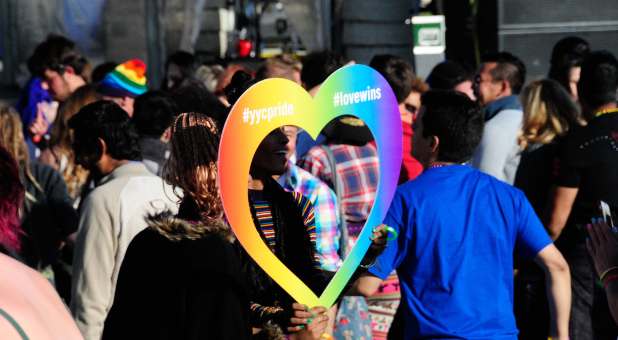Formerly Gay Man Responds to Viral Video of Lesbian Yelling at Street Preacher
Recently, I stumbled across a video on YouTube of a street preacher, ministering the gospel on the corner of a busy intersection in New York City. The viral video, published in April of 2019, begins with a passionate preacher, microphone in hand, sharing God’s view of homosexuality in the Bible. Many gathered around him whose attention had been captured by his preaching. The very mention of the topic of God and sexuality often starts a fire in our culture. More specifically, it starts a fire in the hearts who identify as LGBTQIA+.
It is well known that the LGBT+ community has endured much hatred and judgement, not just from society, but also from the church. As someone who once identified as a homosexual, I am familiar with the pain LGBT+ people are feeling and have felt. I know what it’s like to be abandoned by those closest to you on the basis of your sexuality. I know what it’s like to be verbally and physically assaulted and told I’m going to hell. I know what’s it’s like to feel you are unloved because of your sexual identity, and so much more. But this should give context to why the fire begins.
It is quite evident from the video that the preacher’s statements ruffled some feathers. There were several takeaways from this video. But what stuck out most to me was an older, lesbian-identified woman who pressed her way through the crowd to get into the preacher’s face (Start watching from the 14 min. 57 sec. mark) – “Angry lesbian hears the Gospel.” She began screaming “You’re preaching hate! You’re preaching hate! You’re insulting the essence of my being!” In that moment, I took a gasp of breath and hunched over where I sat, because her words hit me like a ton of bricks.
This woman articulated that being a lesbian, her same-sex attractions, isn’t something she “does.” It’s who she is, she believes. She argued that the attractions are at the core of her being, her identity. Therefore, she interpreted the preaching of the gospel, and possibly some other things the preacher said, as an insult to her humanity.
When I identified as a gay man, I never considered my same-sex orientation apart of my identity. I believed the attractions I had toward the same sex were a result of our fallen sin nature (Ps. 51:5). But what I think, from my Christian perspective, isn’t what’s important, per se. What this woman, and others who think and feel as she does, is of importance. They see the world from a completely different perspective than one whose worldview is the Bible.
My thoughts on the video:
I think any Christian who shares Jesus’s heart for all of mankind to come to repentance and be saved (2 Pet. 3:9) also desires to see the LGBT+ community saved. But sometimes I think our preaching to this community is detached from their experience as human beings. In order to understand how to help them, we must first know what the Scriptures say. But also, we should seek to understand them and their experiences so we can be effective in embracing a community of people whom God loves and for whom He died. But how can we if we don’t befriend them? Sit down and eat with them? Get to know their personhood on a level that has nothing to do with their sexuality?
I’ve heard it said in an interview with the author of Gay Girl, Good God, Jackie Hill Perry “We should befriend those who don’t look like you, or have the same sexual preference as you.” I think the point Jackie made was major because we cannot understand the world around us and how to preach the gospel to every creature if we only live inside our Christian bubbles.
In my humble opinion, if we are going to be effective in ministering to this community, we must take a different approach. Please don’t misinterpret my last sentence. We should preach on street corners and tell the world of the gospel that is able to save and deliver all from sin. But I think we should be intentional about reaching out to people, meeting them where they are, and being willing to love them even if they don’t accept our gospel.
I think it starts with patience and a willingness to understand someone else’s experience that may differ from yours. Patience helps us to see that sometimes our assumptions about people and why they are, the way they are, can be misguided. Our patience often leads to a better understanding of how to walk with people from darkness to the light of Christ. It was this type of discipleship that led me to the cross, where I laid down my gay identity, my sin, in order to follow after Christ. I was introduced to a man who was willing to get to know me, welcome me into his family and disciple me from a holistic perspective. Perhaps that will be another article at some point in the future.
I’ll end with this:
Identity becomes very apparent to someone who feels the very fiber of their being is oriented for the same sex. People often construct their whole lives around this experience—their communities, workplace associations, place of worship, love interests and so on, and when presented with the gospel, which requires repentance and a change of their way of life, it can be terrifying.
“Peter said to them, ‘Repent and be baptized, every one of you, in the name of Jesus Christ for the forgiveness of sins, and you shall receive the gift of the Holy Spirit'” (Acts 2:38).




























































